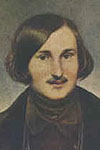The page of Gogol, Nyikolaj Vasziljevics, English biography
Biography
Nikolai Vasilevich Gogol (April 1, 1809 - March 4, 1852) was a Ukrainian-born Russian writer. Although many of his works were influenced by his Ukrainian heritage and upbringing, he wrote in Russian and his works belong to the tradition of Russian literature. Perhaps his best known work is Dead Souls, seen by many as the first "modern" Russian novel.Gogol was born in Sorochintsi of Poltava Guberniya (now Ukraine) to the family of Ukrainian (or rather Ruthenian) small-time nobility (dvoryanstvo). Some of his ancestors associated themselves with Polish Szlachta (probably not by ethnicity but culturally, due to the continued polonization of Ruthenian upper class) and his grand-father Afanasiy Gogol wrote in census papers that "his ancestors, of the family-name Gogol, are of the Polish nation". However, his great-grandfather, Jan Gogol, after studying in Kyiv-Mohyla Academy, a deeply Ukrainian, or Ruthenian, and Orthodox Christian educational institution, moved to the Muscovy leaning Left-bank Ukraine (Malorossia) and settled in Poltava region, originating the Gogol-Janovsky family line. Gogol himself did not use the second part of his name considering it an "artificial Polish addition". Gogol's father died when the boy was 15 years old. The deep religiosity of his mother have likely influenced Gogol's world view as well as the time he spent in the mixed surrounding of local small-time nobility and everyday village life.
He moved to Saint Petersburg in 1828. In 1831, he met Aleksandr Pushkin, who supported him as a writer and became his friend. He later taught history at Saint Petersburg University from 1834 to 1835. He went on to write a number of short stories set in Saint Petersburg, including "Nevsky Prospekt", the Diary of a Madman, "The Overcoat", and "The Nose" (which was later turned into an opera by Dmitri Shostakovich). However, it was his farce The Inspector General, produced in 1836, which first drew him to the public attention as a writer. Its satirical tone, which it shares with much of his other work, caused some controversy, and Gogol fled to Rome.
Gogol spent almost 5 years living abroad in Germany and Italy. It was in this period that he wrote Dead Souls, with the first part published in 1842. (Gogol asked Pushkin for ideas about essential Russian stories; in response, Pushkin suggested the basic idea of Dead Souls.) Gogol decided that before he could continue his work on the novel and bring about the "spiritual regeneration of a crook like Chichikov" (Dead Souls' main character), he had to undergo a spiritual regeneration himself. He imposed upon himself a strict regime of prayer and fasting, and as one might expect, this hindered rather than helped the work on his novel. He declared, "the subject of Dead Souls has nothing to do with the description of Russian provincial life or of a few revolting landowners. It is for the time being a secret which must suddenly and to the amazement of everyone (for as yet none of my readers has guessed it) be revealed in the following volumes..." His inability to reveal this secret, however, drove him into a state of nervous collapse by the beginning of January 1845, and at the end of June he burnt all he had written of the second volume of Dead Souls. For the next seven years his resumed work on the novel was laborious and painful. In 1848, Gogol, who became deeply influenced by Orthodox Christianity made a pilgrimage to Jerusalem. After his return, he fell under the influence of the priest, Father Matthew Konstantinovskii, who regarded his literary work as an abomination in the eyes of the Lord. Konstantinovskii apparently demanded that Gogol destroy the second volume of Dead Souls and "atone for his sin of writing the first volume by entering a monastery". Following a tremendous inner conflict, Gogol decided to carry out Father Konstantinovskii's wishes and burnt the complete second part of his novel on the night of February 24, 1852. He soon after took to his bed, refused all food, and died in great pain nine days later, on March 5, 1852. Some fragments of the work survived and have been published.
He was buried at the Donskoy Monastery, close to his fellow Slavophile Aleksey Khomyakov. In 1931, when Moscow authorities decided to demolish the monastery, his remains were transferred to the Novodevichy Cemetery. His body was discovered lying face down, which gave rise to the story that Gogol had been buried alive. One of Soviet critics even cut a part of his jacket to use as a binding for his copy of the Dead Souls. A piece of rock which used to stand on his grave at the Donskoy was reused for the tomb of Gogol's admirer Mikhail Bulgakov.
source: wikipedia.org




